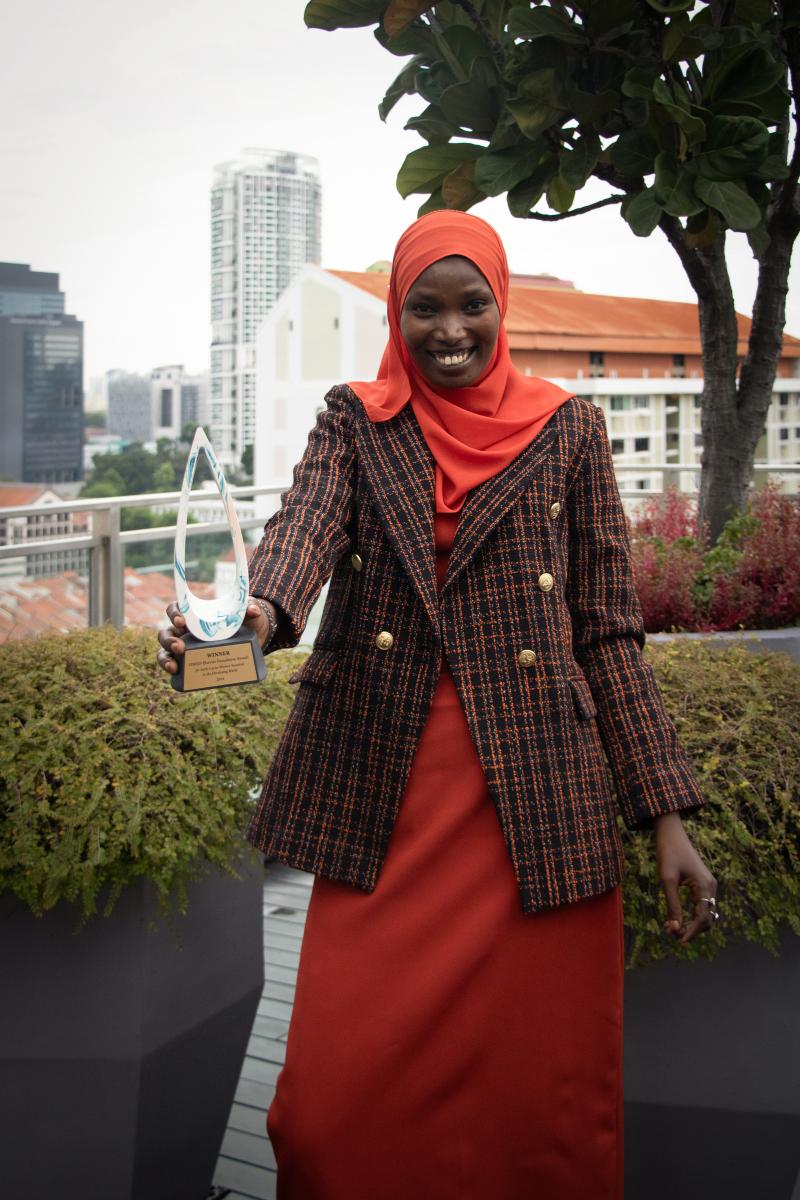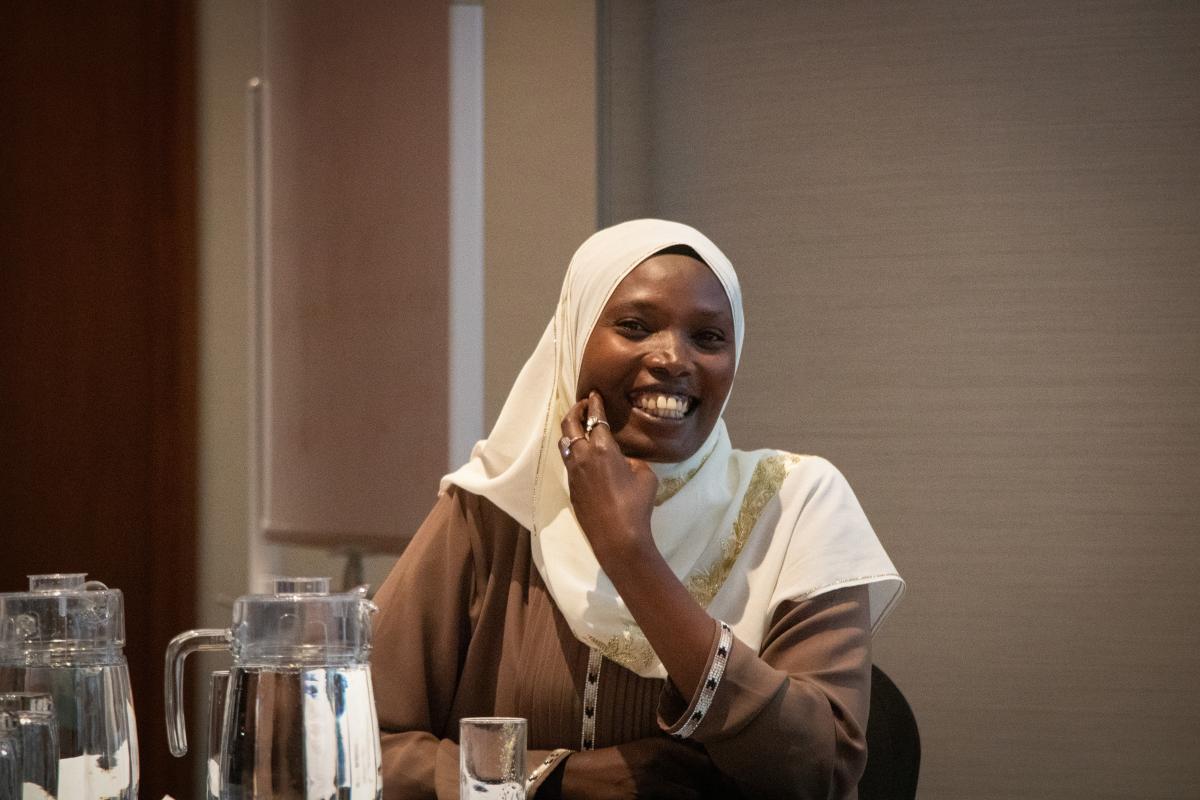
Zubeda Ukundimana
Engineering sciences
A chemical engineer striving to bring clean water access to villages like her own
You must first be safe to be able to think about the environment.
Growing up in the small village of Musambira in Kamonyi district, Rwanda, chemical and environmental engineer Zubeda Ukundimana didn’t have access to clean tap water; villagers drank untreated water collected from springs. “It’s not ready for drinking, but our people drink it,” she says.
As a Master’s student at Badji Mukhtar University in Algeria, trying to decide on a path of research, Zubeda knew she wanted to do something to make clean water more available to villages like hers. It was there that she decided to specialize in environmental engineering, focusing on water, sanitation, and hygiene (WASH), and particularly on wastewater treatment. Her first research was to study the effectiveness of natural adsorbents to produce clean water, for which she used the cones of the Mediterranean cypress tree (Cupressus Sempervirens), abundant in Africa.
 Now, Zubeda is involved in research projects to tackle water and sanitation issues in Africa, especially in capacity building for Africa in the field of WASH. She does this through partnership with researchers in different countries on joint projects such as the ALL4WASH project, a collaboration between six African universities and Norwegian University of Science and Technology (NUST) that supports PhD and Master’s students studying in WASH-related subjects to carry out research or full degree programmes at NUST and at other partner universities within the consortium. Together, the partner universities have developed a common curriculum for WASH students. “I believe strong education is the key to solve all these issues”, says Zubeda. In 2024, she was awarded the OWSD-Elsevier Foundation Award for early career women scientists for her work in WASH.
Now, Zubeda is involved in research projects to tackle water and sanitation issues in Africa, especially in capacity building for Africa in the field of WASH. She does this through partnership with researchers in different countries on joint projects such as the ALL4WASH project, a collaboration between six African universities and Norwegian University of Science and Technology (NUST) that supports PhD and Master’s students studying in WASH-related subjects to carry out research or full degree programmes at NUST and at other partner universities within the consortium. Together, the partner universities have developed a common curriculum for WASH students. “I believe strong education is the key to solve all these issues”, says Zubeda. In 2024, she was awarded the OWSD-Elsevier Foundation Award for early career women scientists for her work in WASH.
Much of Zubeda’s work has focused on cleaning up wastewater. In collaboration with the Rwanda Environment Management Authority (REMA), Zubeda is currently working on a project aimed at assessing the effectiveness of Kigali’s Nyandungu wetland in treating wastewater from surrounding anthropogenic activities. The wetland receives wastewater discharge from industry, residential homes, schools and commercial activities around it. Although REMA has set regulations governing wastewater discharge, they are often ignored. The study Zubeda is carrying out aims at quantifying the level of contamination in the wastewater entering the wetland and evaluating the efficiency of treatments and the water’s suitability for downstream irrigation and domestic use.
Her work on landfill pollution has also helped fill research gaps on an issue that many developing countries face. Landfill leachate, she explains – liquid has that passed through the landfill’s solid waste – should be diverted to a wastewater treatment plant before being discharged to the environment, where it can end up in rivers and groundwater. But this process is tricky. “Solid waste has a lot of chemicals mixed together – metals, detergents, medicines – which makes leachate highly contaminated compared to domestic wastewater. It has chemicals which are resistant to microorganisms used in the domestic plants.” Where biological treatments don’t work, additional chemical processes are needed. Electrooxidation is one such process, in which an electric current applied to electrodes generates oxidizing agents that can degrade persistent organic contaminants. Zubeda experimented with different parameters of this processes – power supply, the type of anodes used, the length of treatment – to optimize their efficiency and remove as many pollutants as possible. Keeping costs and waste products low is also an important consideration. In order to make the treatment more economical, she used small scraps of waste metals like aluminum and iron generated during manufacturing processes as anodes. “It needed more work to clean it, to get it ready, but it worked.”
Zubeda almost didn’t end up in science at all. She was a top student in primary school, but once she reached secondary school, she found herself struggling to keep up – all of her primary school education had been in Kinyarwanda, Rwanda’s national language spoken by most of the population, but her secondary school classes were taught in French. She was determined to succeed, however. “My principle was, ‘I have no right to fail.’ We were a poor family, I had to help my young ones. I had to study hard.”
 By her third year of secondary school, Zubeda’s efforts had paid off. She performed well in all subjects. When it came time to choose a concentration for her fourth and final year, she selected education as her top choice because of the sure job opportunities it would afford her; secondary school graduates in education could work as teachers in the primary schools. Her primary concern was to be able to support her mother, a widowed subsistence farmer, and her 2 younger siblings. The educational training programme was conducted in the capital city Kigali, however, and though she was granted a space in the programme, the school lacked space in the dormitories to host her. Without a place to live, Zubeda was obliged to return to her original secondary school, where she decided to concentrate in science. Along the way, she faced doubt from both herself and others in the community. “There was a misconception in peoples’ minds that this thing was for men. This created a lot of fear in me. I started to have this inner voice saying ‘Chemistry is difficult.’ But I had another force pushing me that said ‘You have to not fail.’” Now, Zubeda says, “[My mother] doesn’t dig anymore. I take care of everything for her.” She was also able to support her younger sister and brother through secondary school and university.
By her third year of secondary school, Zubeda’s efforts had paid off. She performed well in all subjects. When it came time to choose a concentration for her fourth and final year, she selected education as her top choice because of the sure job opportunities it would afford her; secondary school graduates in education could work as teachers in the primary schools. Her primary concern was to be able to support her mother, a widowed subsistence farmer, and her 2 younger siblings. The educational training programme was conducted in the capital city Kigali, however, and though she was granted a space in the programme, the school lacked space in the dormitories to host her. Without a place to live, Zubeda was obliged to return to her original secondary school, where she decided to concentrate in science. Along the way, she faced doubt from both herself and others in the community. “There was a misconception in peoples’ minds that this thing was for men. This created a lot of fear in me. I started to have this inner voice saying ‘Chemistry is difficult.’ But I had another force pushing me that said ‘You have to not fail.’” Now, Zubeda says, “[My mother] doesn’t dig anymore. I take care of everything for her.” She was also able to support her younger sister and brother through secondary school and university.
Rwanda has also made great strides in solving water and sanitation issues. In her home village of Musambira, clean water now flows directly from taps. A 2023 survey found that 87% of people in Rwanda now have access to improved drinking water sources, a classification which means they are generally free from outside contamination. Although there is still much room for improvement in providing access for all and especially in reducing the amount of time people may spend to access water – many sources are still far from people’s homes – the government has set ambitious targets in WASH and has made investments to reach them.
“In Africa, if you ask anyone which country cares about the environment, they will say Rwanda”, Zubeda says. Rwanda was one of the first countries to ban plastic bags, in 2008. Students learn about environmental protection from a very young age, and every citizen is required to participate in a neighborhood improvement effort on the last Saturday of each month, which involves cleanup and also tree planting. “It is in our blood…we are all very serious and committed to it.”
Rwanda’s emergence as an exemplar of forward-thinking environmentalism is finally starting to outshine its tragic history. “Rwanda has passed through a very difficult time. After [the 1994 genocide], there was nothing in the country. But everything now has flourished…the economy has risen. It is peaceful. You must first be safe to be able to think about the environment.”










































